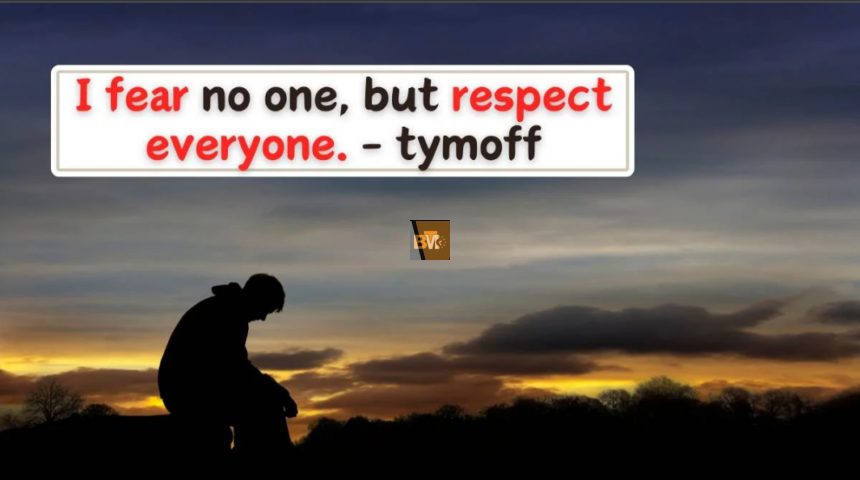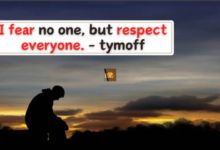The phrase “I fear no one, but respect everyone” is a powerful statement that resonates with many who seek to cultivate personal strength, resilience, and humility. Attributed to the individual known as Tymoff, this phrase captures a mindset that blends confidence with respect, emphasizing the importance of personal empowerment while maintaining an open and respectful attitude toward others. This article delves into the deeper meaning of the phrase, exploring its philosophical roots and how it can be applied to personal growth, relationships, and interactions with others.
Understanding the Core of the Statement
“I fear no one, but respect everyone” encapsulates two powerful ideas that may seem contradictory at first but, when explored more deeply, prove to be complementary. The first part of the phrase, “I fear no one,” communicates a strong sense of self-confidence and inner strength. It suggests a person who is unafraid of challenges, adversity, or the actions of others. This statement can reflect an individual who has overcome their fears or one who believes in their own abilities to navigate the complexities of life without being paralyzed by fear.
On the other hand, the second part of the phrase, “I fear no one, but respect everyone. – tymoff” tempers the first part with humility and openness. It implies that while the person may be confident and fearless, they do not see themselves as superior to others. Instead, they acknowledge the value, uniqueness, and dignity of everyone they encounter. Respecting everyone means understanding that every individual has their own strengths, weaknesses, and perspectives that deserve recognition. Together, these two elements create a balanced perspective that can be incredibly empowering and meaningful.
Fearlessness: The Foundation of Confidence
The idea of fearing no one is often associated with a strong sense of self-worth and mental fortitude. Fearlessness does not mean a lack of concern or avoidance of danger, but rather the courage to face challenges head-on without being intimidated by others or by the situation at hand. People who adopt this mindset are often seen as individuals who believe in their own abilities and resilience.
For many, fearlessness is a product of experience. Having faced and overcome various challenges, they come to realize that fear is often a mental construct rather than an actual obstacle. Overcoming fear requires a deep understanding of one’s own strengths and a willingness to face discomfort in order to grow. In this sense, fearlessness is not about being invincible but about embracing vulnerability, trusting one’s capabilities, and taking calculated risks.
In a world that is often filled with uncertainty and adversity, the idea of fearing no one can be liberating. It allows individuals to act boldly, make decisions with confidence, and pursue their goals without being held back by external pressures or the opinions of others. This fearlessness also has a practical side; it enables individuals to stand firm in their beliefs and make difficult choices, even when others may challenge or criticize them.
Respect: The Cornerstone of Humility and Connection
While fearlessness is important, respect is what grounds the individual in reality and keeps them connected to others. The phrase “respect everyone” highlights the importance of recognizing the inherent value in all people, regardless of their status, background, or differences. Respecting others is an acknowledgment that everyone has something to offer and that every person’s perspective and experiences are valid.
Respect is a cornerstone of healthy relationships, both personal and professional. It allows for communication to flow freely, with an openness to differing opinions, ideas, and ways of life. By respecting others, individuals can learn from each other, build stronger communities, and foster environments of collaboration and mutual growth.
Respect is not about agreeing with everyone or avoiding conflict, but rather about honoring the dignity of others, even when differences arise. This is especially important in a world that often seems polarized, where disagreements and divisions can quickly escalate. By adhering to the principle of respecting everyone, individuals can bridge gaps, defuse tensions, and promote understanding.
Furthermore, respect for others reflects a deep understanding of one’s own place in the world. It requires humility to acknowledge that we do not know everything and that there is always room for learning and improvement. Those who respect everyone are often more open to constructive feedback and are willing to engage in dialogue that challenges their views, which in turn facilitates personal growth.
Applying the Philosophy to Daily Life
The philosophy behind “I fear no one, but respect everyone” can be applied in a variety of contexts, from personal development to leadership, and even in our interactions with society at large. Embracing this philosophy encourages individuals to cultivate both inner strength and emotional intelligence, helping them navigate life’s challenges with grace and understanding.
In personal development, this philosophy can serve as a guide to overcoming insecurities and self-doubt. By fostering a mindset of fearlessness, individuals can break free from the mental barriers that hold them back. This might involve stepping outside of comfort zones, trying new things, and embracing change. The fear of failure, rejection, or inadequacy often prevents people from pursuing their dreams, but by adopting the belief that they fear no one, they are empowered to take bold actions in their personal growth journey.
Simultaneously, respecting everyone ensures that the pursuit of personal growth does not come at the expense of others. It creates a balanced approach where individuals can strive for excellence without undermining or belittling those around them. In leadership, for example, a leader who embodies this philosophy can inspire others to perform at their best while fostering an environment of mutual respect and support.
In relationships, both personal and professional, this mindset promotes healthy boundaries, honest communication, and emotional maturity. Fearlessness allows individuals to express themselves authentically, while respect ensures that they do so in a way that honors the feelings and perspectives of others. This balance can lead to stronger, more fulfilling connections, where both parties feel heard, valued, and understood.
The Impact on Society and Culture
When adopted on a larger scale, the philosophy of fearing no one but respecting everyone has the potential to create a more compassionate and resilient society. In a world where division, conflict, and misunderstandings often dominate headlines, this mindset can serve as a reminder of the power of mutual respect and courage.
Fearing no one, in this sense, does not imply a disregard for others or a lack of empathy, but rather a recognition that strength comes from within and that external challenges, though difficult, are not insurmountable. At the same time, respecting everyone fosters a culture of inclusivity and understanding, where differences are celebrated rather than feared or dismissed.
This balance of fearlessness and respect has the potential to drive social change by encouraging people to confront injustices and challenge systems of oppression while simultaneously fostering compassion and empathy toward those who may I fear no one, but respect everyone. – tymoff hold differing opinions or experiences. By creating spaces where fear does not dictate our actions but respect guides our interactions, society can move toward greater unity and collective progress.
Conclusion
“I fear no one, but respect everyone” is more than just a catchy phrase; it embodies a philosophy that blends strength with humility, confidence with understanding. Tymoff’s words encourage individuals to cultivate personal empowerment and resilience without losing sight of the importance of respecting others. This balance of fearlessness and respect can transform how we approach personal challenges, relationships, and society as a whole. By internalizing this philosophy, we not only become stronger individuals but also contribute to a more empathetic and inclusive world. In a time when divisiveness often prevails, this mindset offers a refreshing reminder that fear need not define us, and respect can build bridges that bring us together.

